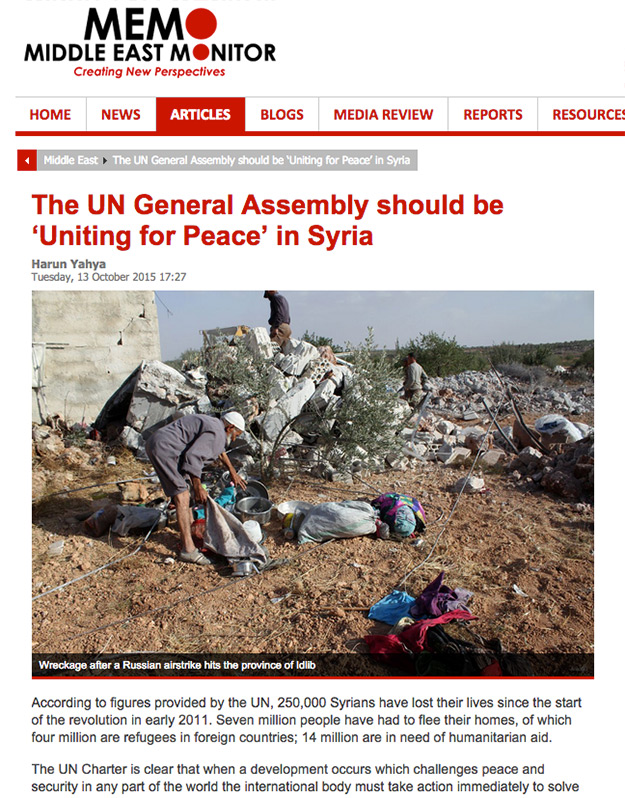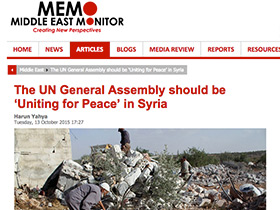
According to figures provided by the UN, 250,000 Syrians have lost their lives since the start of the revolution in early 2011. Seven million people have had to flee their homes, of which four million are refugees in foreign countries; 14 million are in need of humanitarian aid.
The UN Charter is clear that when a development occurs which challenges peace and security in any part of the world the international body must take action immediately to solve such matters through peaceful means. If such action is insufficient, the UN must negotiate the military options and implement them according to the needs of the situation.
When, for example, North Korea invaded South Korea in 1950 and Iraq invaded Kuwait in 1990, the UN took immediate action, with initiatives to end these and similar invasions. It was relatively successful in putting an end to such conflicts. So why doesn’t the UN intervene in Syria? Why hasn’t this issue been solved after almost five years?
The answer to this legitimate question is hidden within the UN Charter itself. Signed in 1945 after the Second World War, the charter granted the duty of keeping world peace to the Security Council. Article 23/1 of the charter names five (the USA, Britain, France, USSR and China) of the countries among the fifteen countries that constitute the Security Council as permanent members. Article 27/3 set out the condition of having unanimity among the five permanent members.
Hence, although the Security Council can pass a resolution with at least nine members voting in favour, five of these must be the permanent members. Consequently, this grants any one of the five permanent members the ability to block any decision made by the Security Council. The term “veto” was not mentioned in the charter, but it is in common use on such occasions.
This right to veto was criticised heavily during the charter’s drafting process but the countries that wanted to repair the devastation caused by the world war and secure peace signed the document despite the risks in the text imposed by the five permanent members. The USSR has, of course, since been replaced as a permanent member by Russia, following the break-up of the old Soviet Union.
It has to be said that the criticisms made against the formation and working methods of the Security Council have turned out to be justified. For instance, in 1965 the US invaded Vietnam without any UN ruling to back it; it also invaded the Dominican Republic in 1965, Grenada in 1983 and Panama in 1989. In 1984, the US attacked Nicaragua. All of these incidents were in violation of Article Two of the UN Charter and thus required the Security Council to take action; by using its veto on each occasion, though, the US was able to block any resolution against itself.
The former USSR also abused the veto. It invaded Hungary in 1956, Czechoslovakia in 1968 and Afghanistan in 1979. Only last year, Russia violated Article Two of the UN Charter in Crimea and Ukraine and, again, the veto was used by a permanent member of the Security Council to block a resolution against itself.
Today the same permanent members of the council are using their veto to block UN action for international intervention in Syria, despite the humanitarian crisis that is affecting much of the world, but Turkey and Syria’s other neighbours more than most.
Since the beginning of the Syrian civil war, four draft resolutions have been presented to the UN Security Council; all have been vetoed by Russia and China to protect their “interests” and ally in Damascus. Looked at from Russia’s perspective, it is clear that the issues that Moscow regards as urgent in Syria were not brought to the fore by the UN; the draft resolutions did not propose solutions acceptable to Russia so a consensus amongst the permanent members was always going to be near impossible to achieve.
At this point two possible solutions come to mind: either resolutions can be drafted in such a way so as to satisfy all of the permanent members of the Security Council; or limit — or even abolish — the right of veto. The latter is not even remotely likely, because an amendment would be needed to Article 27 of the UN Charter to permit this, which would require the agreement of all five permanent members who hold a veto. Both Russia and the US have always made it clear that they will never vote in favour of a move to restrict or remove that right.
As such, efforts to find a solution within the current system seem more feasible. The most important of these opportunities is UN General Assembly Resolution 377 A (V), the “Uniting for Peace” resolution.
During the Korean War, a practical solution was agreed to bypass the stalemate that occurred due to the vetoes of the USSR, just as we see with Syria today. The General Assembly made a broad interpretation of Article 12 of the UN Charter and passed the resolution (which could not be issued by the Security Council due to the veto) as a “recommendation” to the member states. This initiative brought about the required solution to the problem.
This “Uniting for Peace” resolution could be used to overcome the Syrian problem or, indeed, other similar chronic crises. When the UN General Assembly determines a failure in the fulfilment of its essential responsibility to maintain international peace and security, it can take up recommendation resolutions of the member states in order to take the measures foreseen by Chapter VI and Chapter VII. Following this, the international community can seize the initiative and take the necessary steps towards a solution. However, as noted earlier, for this to happen an outlook made up of suggested solutions from all UN member states is required.
At this point it is also very important for the resolution issued by the General Assembly to be a “recommendation”. In other words, it should be non-binding upon the member states; a recommendation approved by two-thirds of the UN General Assembly would, though, contain a great deal of legitimacy, which is essential for international law.
Consequently, in the face of the impossibility of making an amendment regarding the restriction of veto rights in the UN Charter, the “Uniting for Peace” resolution may be a more practical way to establish peace and still remain within the current UN system. Shouldn’t member states at least give it a try?
Adnan Oktar's piece on Middle East Monitor:


